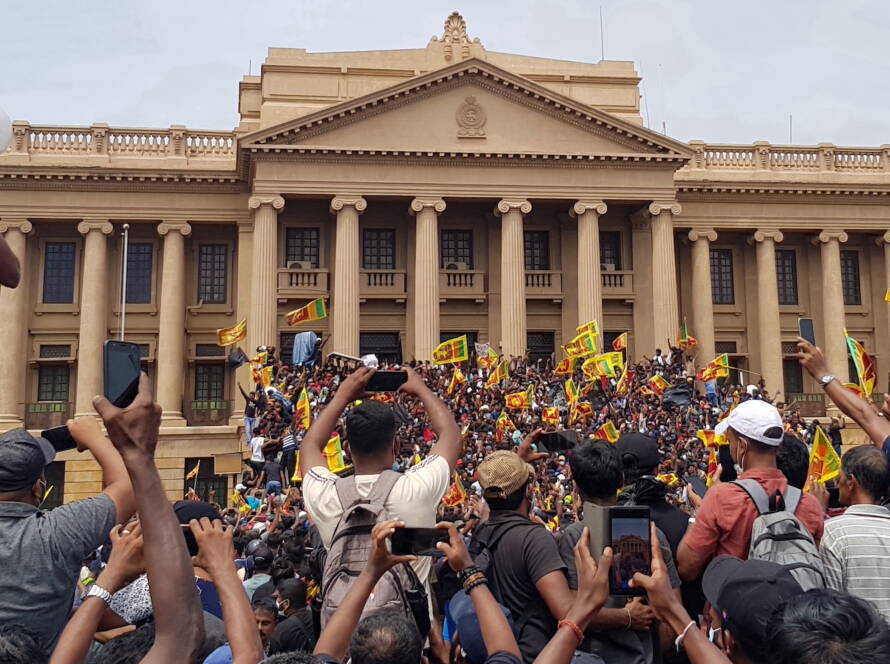By Sanja de Silva Jayatilleka
South Africa will be hosting the 15th BRICS summit this year from August 22 to 24, under the theme “Partnership for Mutually Accelerated Growth, Sustainable Development and Inclusive Multilateralism.” South Africa’s President Cyril Ramaphosa, addressing his National Assembly in this context, said that a strategic priority for his country was “strengthening multilateralism, including working toward real reform of global governance institutions.”
Authentic multilateralism seems to also require multipolarity, in close congruence with multilateralism. One of the paths to such a multilateralism appears to run through the New Development Bank (NDB) created by the BRICS countries (Brazil, Russia, India, China, and South Africa) in 2014, with the purpose of mobilizing resources for infrastructure and sustainable development projects in emerging markets and developing countries.
In 2021, Bangladesh, Egypt, the United Arab Emirates, and Uruguay were welcomed as new members of the Bank. President Ramaphosa said that the Bank was positioned “as an important global financing mechanism for emerging markets and developing economies.”
A constant aspiration of the non-Western economies, true multilateralism now appears to be understood as a realistic prospect only through offering alternatives to the hegemony of the US dollar, the dominant reserve currency.
The yuan has overtaken the dollar in Russia, and by the first quarter of 2020, according to the International Banker, the dollar’s share of bilateral trade between the two countries had fallen below 50 percent for the first time on record, from almost 90 percent just five years ago.
Brazil has also agreed to trade with China in yuan. India has agreed with 18 countries including Sri Lanka to trade in Indian Rupees. A BRICS currency however is where the NDB, a possible future alternative to the World Bank and the IMF for the Global South, could play an indispensable role.
This desire of the non-western economies to find an alternative was evident on Thursday 13th April this year at the New Development Bank (better known as “the BRICS bank”) in Shanghai, China, where Brazil’s President Luis Inacio “Lula” da Silva added his voice to the call for an alternative to the US dollar.
In remarks widely reported around the world, Lula said, “Every night I ask myself why should every country have to be tied to the dollar for trade? Why can’t we trade in our own currency? Why can’t a bank like the BRICS bank have a currency to finance trade between Brazil and China and between Brazil and other BRICS countries?”
President Lula was attending the inauguration of the newly appointed President of the New Development Bank (NDB), economist and Brazil’s former President Dilma Rousseff, who happens to be Lula’s protégé and at one point his successor.
A possible future alternative to the World Bank and the IMF for the Global South, the New Development Bank was created by Brazil, Russia, India, China, and South Africa in 2014 with the purpose of mobilizing resources for infrastructure and sustainable development projects in emerging markets and developing countries. It is reported that in 2022, intra-BRICS trade reached USD 162 billion.
President Lula suggested in his speech at the NDB that a new BRICS currency “frees emerging countries from submission to traditional financial institutions.” Lula criticized the IMF’s imposition of austerity measures.
“No bank should be asphyxiating countries’ economies the way the IMF is doing now with Argentina, or the way they did with Brazil for a long time, and every third-world country… No leader can work with a knife to their throat because [their country] owes money…”
Non-Dollar Alternatives and The R5 Project
There is already a working group within BRICS tasked with proposing a new reserve currency for the five BRICS countries that could be based on gold and other commodities. Since the local currencies of all five countries of the BRICS starts with the letter R (renminbi, rubles, reais, rupees, and rands) the project is called R5. This project is to enable these countries to trade with each other without dependence on the US dollar.
Yaroslav Lissovolik writes that the idea of a BRICS currency was mooted at the Valdai Club, Russia, in 2018. Since it was not conceived to replace any national currencies, he says that in the short term the currency does not have to be used in all trade transactions.
“Initially, the new BRICS currency could perform the role of an accounting unit to facilitate transactions in national currencies. In the longer run, the R5 BRICS currency could start to perform the role of settlements / payments as well as the store of value / reserves for the central banks of emerging market economies.” He believes that the R5+ project could become “one of the most important contributions of emerging markets to building a more secure international financial system.”
It was reported recently that 2023 would be a significant year for the BRICS grouping:
“One of the clearest trends the world witnessed in 2022 was the accelerating eastward shift in global economic power… With significant progress being made by the BRICS …in terms of joint policy coordination and with several other economies showing clear signs of interest in joining the increasingly influential bloc, 2023 looks set to be the BRICS bloc’s most impactful year within the global economic and geopolitical landscape.”
The findings of a recent scholarly study on the BRICS efforts to de-dollarize global trade, published online by Cambridge University Press on February 24, 2022 are significant with regard to the group’s commitment:
“We find that BRICS members have demonstrated an unambiguous consensus and a strong commitment to promoting the use of local currencies…and building a nondollar alternative global financial infrastructure… The group has also been planning the launch of a common payment framework that can be integrated with a BRICS digital currency to de-dollarize global financial infrastructure. BRICS has… also created a nascent de-dollarization infrastructure that supports global de-dollarization in the long term.”
The study found that even US allies are seeking greater financial autonomy to trade with countries under US sanctions and quotes the Governor of the Bank of England, Mark Carney, at a symposium for Central bankers, describing the dollar’s dominance as the “destabilizing asymmetry… at the heart of international monetary and financial system.”
Several other countries have reportedly expressed a desire to join BRICS, including Saudi Arabia, Iran, Indonesia, the UAE, Bahrain, Egypt, Algeria, and Argentina. With BRICS open to other countries joining the group, the group’s share of the global economy is set to expand.
“Financial Multipolarity”
This new tendency to move away from a single dominant reserve currency to increasing trade in national currencies is being called “financial multipolarity.” This is but a signpost on the path towards the multipolar world that the non-western countries have long been urging. This trend is not to everyone’s liking, obviously, but the post-Ukraine US sanctions on Russia and earlier sanctions on China may have accelerated the very thing they wanted to avoid.
The 2023 Foreign Policy Concept Paper of the Russian Federation makes clear its determination to vigorously pursue an alternative world order. It believes that the changes already underway cannot be overturned and are moving inexorably towards its logical conclusion of a more equitable, multipolar world order, regardless of attempts to delay it.
“The formation of a more equitable multipolar world order is underway… The changes which are now taking place … are nonetheless not welcomed by a number of states being used to the logic of global dominance and neocolonialism. These countries refuse to recognize the realities of a multipolar world.”
It welcomes the circumvention of the dominance of the US dollar: “New national and trans-border payment systems are becoming widespread, there is a growing interest in new international reserve currencies, and prerequisites for diversifying international economic cooperation mechanisms are being created.”
Sri Lanka’s Professor Mohan Munasinghe, a Nobel Laureate, interviewed by CNN International’s anchor Zain Asher in Miami, said that “a multipolar world is more attractive to the Global South”, adding that the existing world order was not doing too well, and that the emergence of the BRICS countries “gives the world more hope.”
Professor Munasinghe said, and Asher concurred, that BRICS countries have overtaken the G7 countries in terms of their contribution to the global GDP. He said the new priorities for the Global South are “sustainability, economic development and raising the poor out of poverty” and they are less interested in military interventions and economic sanctions.
Provoking Multipolarity
An Observer Research Foundation (ORF) paper by Antara Ghosal Singh, published in 2022, explains the circumstances which prompted the expansion of the BRICS. “It was in 2017, in the first year of Trump’s presidency, that China, for the first time, proposed an expanded BRICS.”
Later, despite Joe Biden coming to power after defeating Trump, Chinese observers believe that US policy towards China has hardly changed, and that the ‘new Cold War’—initiated during the Trump era—has instead been taken to a higher level.” The paper points out how the ‘G2’ (USA-China) quickly collapsed as “cooperation” turned into “confrontation”, thus deciding China’s priorities towards a broader coalition of developing states.
The Russia-Ukraine war and the consequent consolidation of the Western bloc together with the sanctions on Russia have contributed to renewed interest in the calls for multipolarity. It is significant that none of the members of the BRICS countries took part in the US sanctions against Russia. In fact, both India and China have increased their trade with Russia.
Dimitri Trenin, head of Carnegie-Moscow, sees the current moment as fundamentally significant:
“What is at stake here is not just the fate of Ukraine or the future of Taiwan. The issue is the existing world order itself and its current organizing principle – America’s global hegemony.”
Feelings have soured considerably in the Russian intelligentsia against what they see as attempts to “eliminate Russia as a major power.” Trenin sees multipolarity as the most effective response: “…a greater joint effort to help the world move faster toward multipolarity.” He recommends “reducing role of the US dollar in international transactions” and strengthening institutions such as BRICS and the SCO as steps towards achieving it.
Sanja de Silva Jayatilleka is the author of “Mission Impossible – Geneva” (Vijitha Yapa, Colombo, 2017).
Factum is an Asia-Pacific focused think tank on International Relations, Tech Cooperation and Strategic Communications accessible via www.factum.lk.
The views expressed here are the author’s own and do not necessarily reflect the organization’s.


